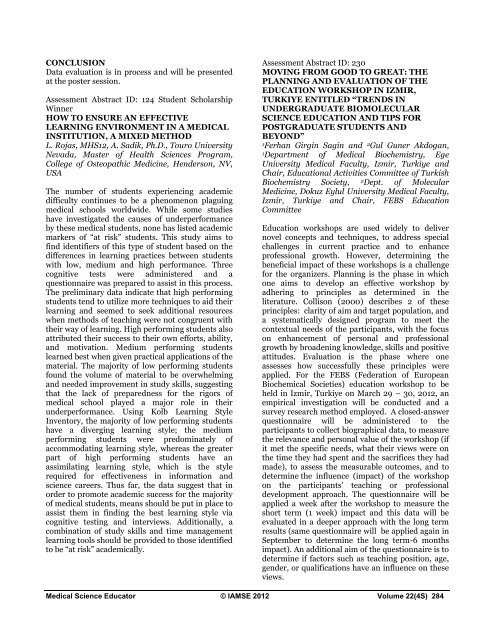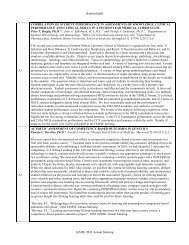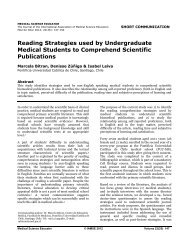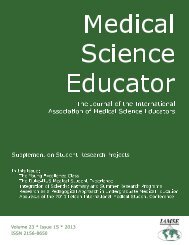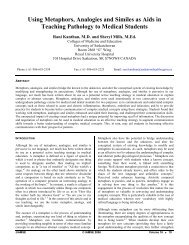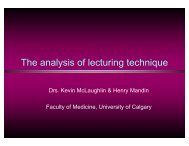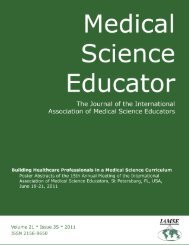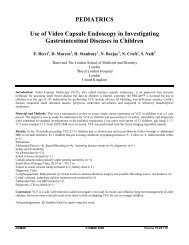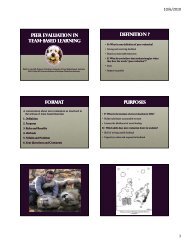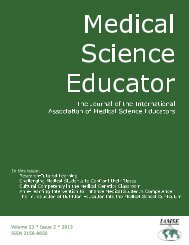Click here to view complete journal in pdf-format - IAMSE
Click here to view complete journal in pdf-format - IAMSE
Click here to view complete journal in pdf-format - IAMSE
Create successful ePaper yourself
Turn your PDF publications into a flip-book with our unique Google optimized e-Paper software.
CONCLUSION<br />
Data evaluation is <strong>in</strong> process and will be presented<br />
at the poster session.<br />
Assessment Abstract ID: 124 Student Scholarship<br />
W<strong>in</strong>ner<br />
HOW TO ENSURE AN EFFECTIVE<br />
LEARNING ENVIRONMENT IN A MEDICAL<br />
INSTITUTION, A MIXED METHOD<br />
L. Rojas, MHS12, A. Sadik, Ph.D., Touro University<br />
Nevada, Master of Health Sciences Program,<br />
College of Osteopathic Medic<strong>in</strong>e, Henderson, NV,<br />
USA<br />
The number of students experienc<strong>in</strong>g academic<br />
difficulty cont<strong>in</strong>ues <strong>to</strong> be a phenomenon plagu<strong>in</strong>g<br />
medical schools worldwide. While some studies<br />
have <strong>in</strong>vestigated the causes of underperformance<br />
by these medical students, none has listed academic<br />
markers of “at risk” students. This study aims <strong>to</strong><br />
f<strong>in</strong>d identifiers of this type of student based on the<br />
differences <strong>in</strong> learn<strong>in</strong>g practices between students<br />
with low, medium and high performance. Three<br />
cognitive tests were adm<strong>in</strong>istered and a<br />
questionnaire was prepared <strong>to</strong> assist <strong>in</strong> this process.<br />
The prelim<strong>in</strong>ary data <strong>in</strong>dicate that high perform<strong>in</strong>g<br />
students tend <strong>to</strong> utilize more techniques <strong>to</strong> aid their<br />
learn<strong>in</strong>g and seemed <strong>to</strong> seek additional resources<br />
when methods of teach<strong>in</strong>g were not congruent with<br />
their way of learn<strong>in</strong>g. High perform<strong>in</strong>g students also<br />
attributed their success <strong>to</strong> their own efforts, ability,<br />
and motivation. Medium perform<strong>in</strong>g students<br />
learned best when given practical applications of the<br />
material. The majority of low perform<strong>in</strong>g students<br />
found the volume of material <strong>to</strong> be overwhelm<strong>in</strong>g<br />
and needed improvement <strong>in</strong> study skills, suggest<strong>in</strong>g<br />
that the lack of preparedness for the rigors of<br />
medical school played a major role <strong>in</strong> their<br />
underperformance. Us<strong>in</strong>g Kolb Learn<strong>in</strong>g Style<br />
Inven<strong>to</strong>ry, the majority of low perform<strong>in</strong>g students<br />
have a diverg<strong>in</strong>g learn<strong>in</strong>g style; the medium<br />
perform<strong>in</strong>g students were predom<strong>in</strong>ately of<br />
accommodat<strong>in</strong>g learn<strong>in</strong>g style, w<strong>here</strong>as the greater<br />
part of high perform<strong>in</strong>g students have an<br />
assimilat<strong>in</strong>g learn<strong>in</strong>g style, which is the style<br />
required for effectiveness <strong>in</strong> <strong>in</strong><strong>format</strong>ion and<br />
science careers. Thus far, the data suggest that <strong>in</strong><br />
order <strong>to</strong> promote academic success for the majority<br />
of medical students, means should be put <strong>in</strong> place <strong>to</strong><br />
assist them <strong>in</strong> f<strong>in</strong>d<strong>in</strong>g the best learn<strong>in</strong>g style via<br />
cognitive test<strong>in</strong>g and <strong>in</strong>ter<strong>view</strong>s. Additionally, a<br />
comb<strong>in</strong>ation of study skills and time management<br />
learn<strong>in</strong>g <strong>to</strong>ols should be provided <strong>to</strong> those identified<br />
<strong>to</strong> be “at risk” academically.<br />
Assessment Abstract ID: 230<br />
MOVING FROM GOOD TO GREAT: THE<br />
PLANNING AND EVALUATION OF THE<br />
EDUCATION WORKSHOP IN IZMIR,<br />
TURKIYE ENTITLED “TRENDS IN<br />
UNDERGRADUATE BIOMOLECULAR<br />
SCIENCE EDUCATION AND TIPS FOR<br />
POSTGRADUATE STUDENTS AND<br />
BEYOND”<br />
1 Ferhan Girg<strong>in</strong> Sag<strong>in</strong> and 2 Gul Guner Akdogan,<br />
1 Department of Medical Biochemistry, Ege<br />
University Medical Faculty, Izmir, Turkiye and<br />
Chair, Educational Activities Committee of Turkish<br />
Biochemistry Society, 2 Dept. of Molecular<br />
Medic<strong>in</strong>e, Dokuz Eylul University Medical Faculty,<br />
Izmir, Turkiye and Chair, FEBS Education<br />
Committee<br />
Education workshops are used widely <strong>to</strong> deliver<br />
novel concepts and techniques, <strong>to</strong> address special<br />
challenges <strong>in</strong> current practice and <strong>to</strong> enhance<br />
professional growth. However, determ<strong>in</strong><strong>in</strong>g the<br />
beneficial impact of these workshops is a challenge<br />
for the organizers. Plann<strong>in</strong>g is the phase <strong>in</strong> which<br />
one aims <strong>to</strong> develop an effective workshop by<br />
adher<strong>in</strong>g <strong>to</strong> pr<strong>in</strong>ciples as determ<strong>in</strong>ed <strong>in</strong> the<br />
literature. Collison (2000) describes 2 of these<br />
pr<strong>in</strong>ciples: clarity of aim and target population, and<br />
a systematically designed program <strong>to</strong> meet the<br />
contextual needs of the participants, with the focus<br />
on enhancement of personal and professional<br />
growth by broaden<strong>in</strong>g knowledge, skills and positive<br />
attitudes. Evaluation is the phase w<strong>here</strong> one<br />
assesses how successfully these pr<strong>in</strong>ciples were<br />
applied. For the FEBS (Federation of European<br />
Biochemical Societies) education workshop <strong>to</strong> be<br />
held <strong>in</strong> Izmir, Turkiye on March 29 – 30, 2012, an<br />
empirical <strong>in</strong>vestigation will be conducted and a<br />
survey research method employed. A closed-answer<br />
questionnaire will be adm<strong>in</strong>istered <strong>to</strong> the<br />
participants <strong>to</strong> collect biographical data, <strong>to</strong> measure<br />
the relevance and personal value of the workshop (if<br />
it met the specific needs, what their <strong>view</strong>s were on<br />
the time they had spent and the sacrifices they had<br />
made), <strong>to</strong> assess the measurable outcomes, and <strong>to</strong><br />
determ<strong>in</strong>e the <strong>in</strong>fluence (impact) of the workshop<br />
on the participants' teach<strong>in</strong>g or professional<br />
development approach. The questionnaire will be<br />
applied a week after the workshop <strong>to</strong> measure the<br />
short term (1 week) impact and this data will be<br />
evaluated <strong>in</strong> a deeper approach with the long term<br />
results (same questionnaire will be applied aga<strong>in</strong> <strong>in</strong><br />
September <strong>to</strong> determ<strong>in</strong>e the long term-6 months<br />
impact). An additional aim of the questionnaire is <strong>to</strong><br />
determ<strong>in</strong>e if fac<strong>to</strong>rs such as teach<strong>in</strong>g position, age,<br />
gender, or qualifications have an <strong>in</strong>fluence on these<br />
<strong>view</strong>s.<br />
Medical Science Educa<strong>to</strong>r © <strong>IAMSE</strong> 2012 Volume 22(4S) 284


